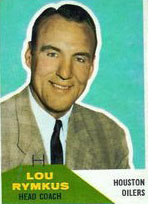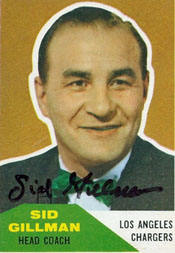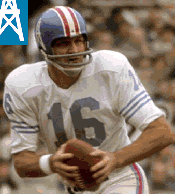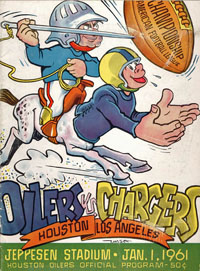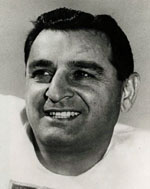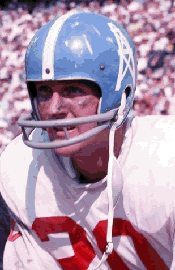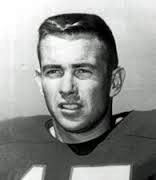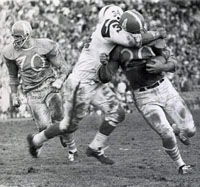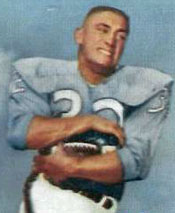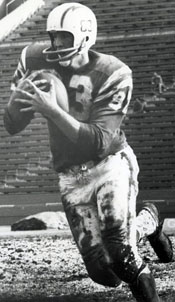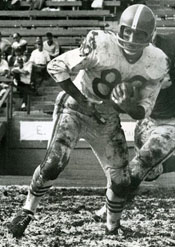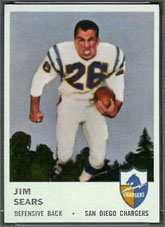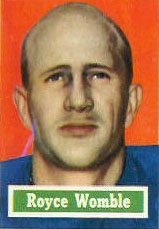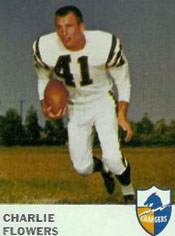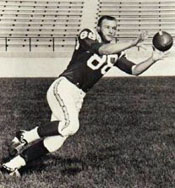1960: Los Angeles Chargers @ Houston OilersThis series covers the history of the American Football League through the prism of its yearly championship games.
Note: The gray boxes contain asides that provide interesting material but could be skipped
without losing the continuity of the article.
The American Football League began as a dream of 28-year-old Lamar Hunt.
- The son of oil tycoon H. L. Hunt had yearned to bring an NFL expansion team to Dallas but was repeatedly rebuffed.
- He also tried to buy a controlling interest in the Chicago Cardinals but was unable to do so.
- So he decided to start a league of his own.
The owners he enlisted were christened the "Foolish Club."
- They included oil man Bud Adams of Houston, who had also gone after the Cardinals.
- Now that he had the makings of a Texas rivalry between Dallas and Houston, Hunt targeted Denver, Minneapolis, and Seattle as large cities that would welcome pro football. However, Seattle had no stadium.
- Bob Howsam, whose family owned the AAA Denver Bears baseball team, stepped to the plate to finance a team in the Mile High City, and Max Winter agreed to start one in the Twin Cities.
Lamar also knew that he had to place franchises in New York and Los Angeles in order to be recognized as a major league.
Buffalo and Boston turned out to be those cities.
- Ralph Wilson, another part owner of the Lions, tried to put together an AFL team in Miami but failed. So he turned to Buffalo.
- Billy Sullivan, who had failed to obtain an NFL franchise for Boston, paid the $25,000 to get into the AFL.
The league hired Joe Foss, a World War II ace, as its first commissioner and prepared for its first draft on November 22, 1959.
- But the NFL did not sit quietly by. After refusing for years to add new cities to the 12-team league, the owners voted to establish an expansion franchise in Dallas to compete with Hunt's team in 1960.
- George Halas also promised Tex Winter, head of the AFL franchise in Minneapolis-St. Paul, that the NFL would award him a franchise for 1961. As a result, Winter pulled out of the AFL a month after the draft.
- Foss and Hunt scrambled to find a replacement. Bowing to Hilton's wishes to have a natural rivalry on the West Coast, the AFL shifted the players Minneapolis had chosen to Oakland.
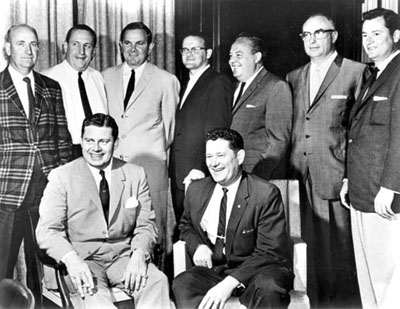
The original AFL ownes with Commissioner Joe Foss (front row, right).
Bud Adams sits next to Foss. Lamar Hunt is fourth from left in back row.
Barron Hilton is at far right in back row.
Hunt planned to compete vigorously with the NFL by adopting some new policies.
- The AFL would play 14 regular season games, two more than the NFL.
- The minimum annual salary for players would be 10% higher than the NFL, which paid $6,500.
- The new league would pay officials "substantially more" than the older league.
The AFL would also woo fans with some new rules and procedures.
- Each player's name would appear on the back of his jersey.
- The stadium scoreboard would keep the official time as opposed to the NFL's policy (adopted because most teams played in baseball stadiums) of keeping it on the sidelines.
- The two-point conversion, just introduced into college football in 1959, would be in force.
- The AFL would also throw the ball much more than the NFL, averaging 462 attempts per team in 1960 compared to 316.5 for each NFL club. Each AFL team threw more passes than every NFL eleven.
A major breakthrough for the AFL occurred when ABC agreed to televise all the games.
|
|
|
The first season of the American Football League produced these results.
1960 AFL Standings
| East |
W |
L |
T |
W-L % |
PF |
PA |
| Houston Oilers |
10 |
4 |
0 |
.714 |
379 |
285 |
| New York Titans |
7 |
7 |
0 |
.500 |
382 |
399 |
| Buffalo Bills |
5 |
8 |
1 |
.385 |
296 |
303 |
| Boston Patriots |
5 |
9 |
0 |
.357 |
286 |
349 |
| West |
|
|
|
|
|
|
| Los Angeles Chargers |
10 |
4 |
0 |
.714 |
373 |
336 |
| Dallas Texans |
8 |
6 |
0 |
.571 |
362 |
253 |
| Oakland Raiders |
6 |
8 |
0 |
.429 |
319 |
388 |
| Denver Broncos |
4 |
9 |
1 |
.308 |
309 |
393 |
The Oilers of Coach Lou Rymkus won the East behind an aging quarterback and a young superstar.
- 33-year-old George Blanda, who had never been given much of a chance with the Chicago Bears, returned to football after not playing in '59 and finished second in the league with 24 touchdown passes.
- Rookie Billy Cannon, the Heisman Trophy winner from LSU, finished third in the league in rushing with 644y. Billy added another 187y receiving and returned eight kickoffs for an average of 33.3y each.
Adams had signed Cannon away from the Los Angeles Rams by offering him a three-year $100,000 contract plus a $10,000 signing bonus, an $8,000 automobile, and a half interest in a $350,000 business.
- The second most prolific offense in terms of points also had other productive players, including FB Dave Smith, who gained 1y less than Cannon but scored more rushing touchdowns (five to one).
- WR Bill Groman's 72 receptions tied him for second with the Titans' Don Maynard, 20 behind Denver's Lionel Taylor. But Groman bested Taylor soundly in receiving yards (1473 to 1235). Charley Hennigan finished seventh with 722y.
- Houston also finished second in points allowed.
- His team's success earned Rymkus AFL Coach of the Year honors.
The Chargers won the West with a 10-4 record, the same as Houston.
- Sid Gillman, who had coached the Rams from 1955-59, implemented his exciting passing offense with Jack Kemp spreading the ball around. The Chargers had seven receivers with at least 21 catches.
Houston head man Rymkus had served as line coach on Gillman's staff with the Rams in 1959. However, they had a falling out, which led to Lou leaving for the AFL.
Their enmity carried over to the championship game. It was pretty clear that he (Rymkus) and Gillman had no love lost for each other, said Oilers S Julian Spence. Basically, they wanted their team to beat the brains out of the other team, on the scoreboard and in the trenches.
- The leader in receptions was SE Ralph Anderson with 44. Just four behind was Dave Kocourek, although Dave led Ralph in yardage, 662-614.
- The leader rusher by far was Paul Lowe with 855y on 136 attempts. Then came FB Howie Ferguson (438/126).
Like all teams in the new league, the Houston and Los Angeles rosters were filled with rookies.
- Houston listed 26 first-year men while the Chargers had 25.
- Interestingly, Gillman deployed six players from hometown USC with two more from UCLA and another five (including Kemp) from other California colleges.
The teams had split their two meetings during the regular season.
- Houston won 38-28 at home September 18 as Kemp threw four interceptions. The Oilers jumped to a 38-14 before LA rallied in the fourth quarter to make the final score more respectable. With an early lead, Houston ran the ball 48 times for 284y and five touchdowns.
- The clash on the muddy field of the Los Angeles Coliseum November 13 saw the teams combine for nine turnovers and LA charge in front 14-0 in the first period on the way to a 24-21 triumph. The Chargers outrushed the visitors 151-49 while Houston threw 55 passes, three of which found their way into Chargers' hands.
|
1960 Los Angeles Chargers
| # |
Player |
Pos. |
Hgt. |
Wgt. |
College |
Exp. |
| 3 |
Ben Agajanian |
K |
6-0 |
215 |
New Mexico |
16 |
| 15 |
Jack Kemp |
QB |
6-1 |
200 |
Occidental |
4 |
| 17 |
Bob Laraba |
QB-P |
6-3 |
195 |
Texas-El Paso |
1 |
| 20 |
Fred Ford |
HB |
5-8 |
180 |
Cal Poly-Pomona |
1 |
| 23 |
Paul Lowe |
HB |
6-0 |
205 |
Oregon State |
1 |
| 26 |
Jimmy Sears |
DB |
5-11 |
185 |
USC |
7 |
| 27 |
Charlie McNeil |
S |
5-11 |
180 |
Compton CC (CA) |
1 |
| 28 |
Royce Womble |
HB |
6-0 |
185 |
North Texas |
7 |
| 29 |
Doyle Nix |
CB |
6-1 |
190 |
SMU |
6 |
| 33 |
Blanche Martin |
FB |
6-0 |
195 |
Michigan State |
1 |
| 34 |
Bob Zeman |
S |
6-1 |
200 |
Wisconsin |
1 |
| 35 |
Bob Garner |
DB |
5-10 |
190 |
Fresno State |
1 |
| 36 |
Dick Harris |
PR |
5-11 |
185 |
McNeese State |
1 |
| 37 |
Howie Ferguson |
FB |
6-2 |
220 |
None |
8 |
| 41 |
Charlie Flowers |
FB |
6-1 |
220 |
Mississippi |
1 |
| 44 |
Trusse Norris |
E |
6-1 |
195 |
UCLA |
1 |
| 51 |
Rommie Loudd |
LB |
6-2 |
225 |
UCLA |
1 |
| 52 |
Don Rogers |
C |
6-2 |
240 |
South Carolina |
1 |
| 53 |
Charlie Brueckman |
LB |
6-2 |
225 |
Pittsburgh |
3 |
| 54 |
Ron Botchan |
LB |
6-1 |
240 |
Occidental |
1 |
| 56 |
Emil Karas |
LB |
6-3 |
230 |
Dayton |
2 |
| 66 |
Fred Cole |
G |
6-0 |
225 |
Maryland |
1 |
| 67 |
Charlie Kempinska |
G |
6-0 |
235 |
Mississippi |
1 |
| 68 |
Orlando Ferrante |
G |
6-0 |
230 |
USC |
1 |
| 69 |
Al Barry |
G |
6-2 |
240 |
USC |
7 |
| 70 |
Volney Peters |
DT |
6-4 |
235 |
USC |
9 |
| 71 |
Dick Chorovich |
DT |
6-4 |
260 |
Miami (OH) |
6 |
| 72 |
Sam DeLuca |
G-T |
6-2 |
250 |
South Carolina |
1 |
| 74 |
Ron Mix |
T |
6-4 |
250 |
USC |
1 |
| 75 |
Ernie Wright |
T |
6-4 |
270 |
Ohio State |
1 |
| 76 |
Gary Finneran |
DE-DT |
6-3 |
240 |
USC |
1 |
| 80 |
Ron Nery |
DE |
6-6 |
245 |
Kansas State |
1 |
| 81 |
Maury Schleicher |
DE |
6-3 |
240 |
Penn State |
2 |
| 82 |
Ralph Anderson |
SE |
6-4 |
225 |
Santa Monica Coll. |
3 |
| 83 |
Dave Kocourek |
FL |
6-5 |
240 |
Wisconsin |
1 |
| 84 |
Paul Maguire |
P |
6-0 |
230 |
Citadel |
1 |
| 87 |
Howard Clark |
TE |
6-2 |
215 |
Tenn.-Chattanooga |
1 |
| 88 |
Don Norton |
E |
6-1 |
190 |
Iowa |
1 |
|
1960 Houston Oilers
| # |
Player |
Pos. |
Hgt. |
Wgt. |
College |
Exp. |
| 12 |
Charlie Milstead |
P |
6-2 |
190 |
Texas A&M |
1 |
| 15 |
Jacky Lee |
QB |
6-1 |
190 |
Cincinnati |
1 |
| 16 |
George Blanda |
QB-K |
6-2 |
215 |
Kentucky |
12 |
| 20 |
Billy Cannon |
HB |
6-1 |
205 |
LSU |
1 |
| 21 |
Ken Hall |
KR |
6-1 |
205 |
Texas A&M |
2 |
| 24 |
Julian Spence |
S |
5-11 |
170 |
Sam Houston State |
3 |
| 30 |
Mike Dukes |
LB |
6-3 |
235 |
Clemson |
1 |
| 31 |
Doug Cline |
LB |
6-2 |
230 |
Clemson |
1 |
| 32 |
Dave Smith |
FB |
6-1 |
210 |
Ripon |
1 |
| 34 |
Charlie Kendall |
DB |
6-2 |
165 |
UCLA |
1 |
| 37 |
Charley Hennigan |
WR |
6-1 |
185 |
Northwestern State (LA) |
1 |
| 40 |
Tony Banfield |
DB |
6-1 |
185 |
Oklahoma State |
1 |
| 41 |
Mark Johnston |
CB |
6-0 |
205 |
Northwestern |
1 |
| 43 |
Jim Norton |
CB |
6-3 |
190 |
Idaho |
1 |
| 44 |
Charley Tolar |
FB |
5-6 |
200 |
Northwestern State (LA) |
1 |
| 47 |
Bobby Gordon |
S |
6-0 |
195 |
Tennessee |
3 |
| 50 |
Dennit Morris |
LB |
6-1 |
230 |
Oklahoma |
3 |
| 51 |
John Simerson |
C-T |
6-3 |
255 |
Purdue |
4 |
| 53 |
Hugh Pitts |
LB-C |
6-2 |
225 |
TCU |
5 |
| 57 |
George Belotti |
C |
6-4 |
250 |
USC |
1 |
| 61 |
Bob Talamini |
G |
6-1 |
255 |
Kentucky |
1 |
| 63 |
Hogan Wharton |
C |
6-2 |
250 |
Houston |
1 |
| 64 |
Fred Wallner |
G |
6-2 |
230 |
Notre Dame |
10 |
| 65 |
Gary Greaves |
C |
6-3 |
235 |
Miami (FL) |
1 |
| 70 |
Al Jamison |
T |
6-5 |
250 |
Colgate |
1 |
| 72 |
Jerry Helluin |
DT |
6-2 |
270 |
Tulane |
9 |
| 73 |
Dan Lanphear |
DE |
6-2 |
230 |
Wisconsin |
1 |
| 74 |
George Shirkey |
DT |
6-4 |
260 |
S. F. Austin |
1 |
| 75 |
Don Floyd |
DE |
6-3 |
245 |
TCU |
1 |
| 76 |
Dalva Allen |
DE |
6-4 |
245 |
Houston |
1 |
| 77 |
Rich Michael |
T |
6-3 |
240 |
Ohio State |
1 |
| 79 |
Orville Trask |
DT |
6-4 |
260 |
Rice |
1 |
| 82 |
John Carson |
TE |
6-3 |
200 |
Georgia |
7 |
| 86 |
John White |
E |
6-2 |
220 |
Ohio State |
1 |
| 88 |
Al Witcher |
E |
6-1 |
200 |
Baylor |
1 |
| 89 |
Bill Groman |
WR |
6-0 |
195 |
Heidelberg |
1 |
|
|
|
The championship game was played Sunday, January 1, 1961, at Jeppesen Stadium, which belonged to the Houston Independent School District.
- ABC telecast the game to an audience estimated at 40,000,000 with Jack Buck doing the play-by-play. With the college bowl games moving to Monday, the AFL had the football airwaves to itself.
- The Oilers, 6.5-point favorites, hoped to sellout the 32,000-seat stadium.
- The players would split all the gate receipts (but not the TV revenue), with 60% of the pot going to the winning team.
The exciting, rough-and-ready contest kept 32,183 (largest crowd of the season for Houston) roaring, howling, and booing from start to finish on a cold, dreary day.
- Quarter 1
The Chargers scored the first two times they had the ball on a pair of field goals by 41-year-old Ben Agajanian, whom Gillman had lured out of retirement. The first, a little over four minutes in, covered 38y and the second, 22. Chargers 6 Oilers 0
Kemp suffered a groin injury when DB Julian Spence, the league's smallest player at 155 lb, cut him down with a vicious tackle. But Jack continued the rest of the contest.
In the final minutes, Blanda missed a 32y field goal effort set up by an interception.
Houston ended the quarter with only one completed pass and one first down.
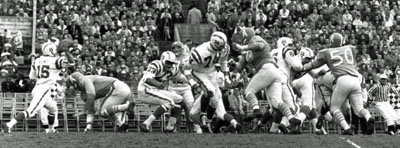
Kemp passes.
- Quarter 2
The home team's offense finally got untracked. Blanda completed three passes in four attempts to cover 68 of the 83y advance that culminated on the 11th play, a 17y pass to Smith, who went the last three with a defender on his back. The biggest gain came on a 3rd-and-8 pass from the Oiler 29 to Cannon streaking through the secondary. Billy toted the pigskin to the LA 33. Oilers 7 Chargers 6
With Spence against blitzing into Kemp's face, Houston DB Bobby Gordon intercepted a pass at his 21 and raced out to the 48. The Chargers took exception to Spence's treatment of their quarterback. While three teammates tracked down the interceptor, the remaining Chargers trapped Spence at midfield and used the lightweight for a punching bag. Players and coaches dashed into the conflict from both benches before officials restored order. Spence and LA end Maury Schleicher were kicked out.
Twelve plays later, Blanda booted an 18y field goal. Oilers 10 Chargers 6 (5:15 left)
Neither team could muster a threat the rest of the half. An LA punt by Bob Laraba was downed on the Houston seven. When three plays gained only 5y,
Charlie Milstead came in to punt. But his boot traveled only 19y out of bounds on the Houston 31 with 0:37 on the clock. After an incompletion, Kemp hit Dave Kocourek for 11y to the 20. That gave Agajanian the opportunity to boot his third field goal, this one 27y, with five seconds left. Oilers 10 Chargers 9
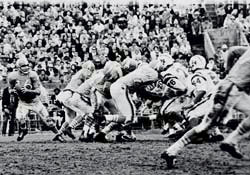
George Blanda fades to pass.
- Quarter 3
Cannon's 42y return of the kickoff to the Houston 45 started a 10-play possession that produced the Oilers' second touchdown. George went 3-for-4 on the drive for 33y, all three to Groman for 17, 13, and, finally, seven. Oilers 17 Chargers 9
But Kemp responded by leading a 63y eight-snap touchdown drive of his own. The key play came when Jack, trapped 20y behind the line of scrimmage, shook loose from four pursuers to get off a 33y jump pass to Kocourek, who went out of bounds on the two. Lowe plunged over the left side on the next play. Gillman chose not to go for two to tie. Oilers 17 Chargers 16
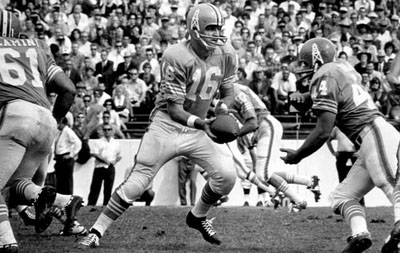
Blanda hands off to Charley Tolar.
- Quarter 4
The visitors punted the Oilers into a hole at the 11 early in the period. After two plays gained just a single yard,
Blanda took advantage of S Jim Sears' tendency to cheat closer to the line of scrimmage to stop the run. Blanda told Cannon and Hennigan to run slants to the same where Sears would have to cover one of them. The other receiver would then cut upfield to the area where Sears would've sat had he been playing deep.
Sears followed Hennigan, so Blanda threw to Cannon as he broke open near the right sideline. Billy took the perfect pass over his shoulder at the 40, broke one tackle, and outraced Sears to pay dirt. Oilers 24 Chargers 16
Aided by an interference penalty, Kemp took the Chargers from their 34 to the Houston 33 before a 4th down completion from Kemp to Royce Womble wound up inches short of a first down. The Chargers howled that an official cost them more than a yard in marking Womble's forward progress.
Gillman was counting on getting the ball back with a chance to kick a winning field goal. But the Oilers thwarted that strategy somewhat when Blanda's passes sparked a 65y time-consuming drive that reached the one. A field goal would put the Oilers up by 11, but Rymkus decided to go for it.
You'd think Blanda would put the ball in Cannon's hands to get the clinching touchdown. Instead, George handed to FB Dave Smith, who was dropped for a 1y loss to keep the margin at eight, just a touchdown and two-point conversion away from a tie with three minutes remaining.
Still, the Chargers had to gain about 50y to move within field goal range. Using passes and Lowe's sweeps, Kemp directed his unit to a 4th-and-10 on his 47 when officials stopped the action for the two-minute warning. When play resumed, Lowe took a handoff and sped 24y to the 29.
The collar around Rymkus's neck got even tighter when Kemp tossed to FB Charlie Flowers to the 22. But Jack's 3rd down pass just eluded the clutches of E Don Norton, who sprawled at the four.
So the game came down to one play. Would Kemp give the ball to Lowe, a remarkable breakaway runner who had squirmed over the slippery terrain for 165y or would he trust the passing arm that had connected 21 times for 171y? Jack called his own number, rolled to his left, and shot a high pass in the direction of Norton at the 10. Don made a desperation leap, but the ball sailed beyond his fingertips. Rymkus dared to breathe again.
In the final minute, Houston OG Hogan Wharton, who doubled as a pro wrestler, was ejected after tangling with DB Dick Harris and applying a half-nelson to an official.
FINAL SCORE:
Oilers 24 Chargers 16
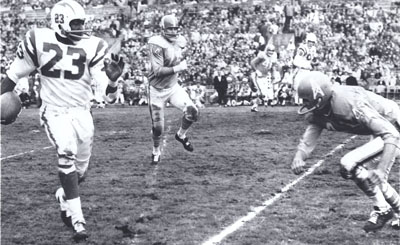
Paul Lowe gets away for 24y as George Shirkey and Jim Norton close in. Cannon won a close balloting for the game's outstanding player.
- The "young Bull of the Bayou" polled eight votes from the press to seven each for Lowe and Blanda.
- Billy totaled 259y running, receiving, and returning.
- Lowe's output exceeded that by 12.
Final statistics:
- First downs: Oilers 17 Chargers 21
- Yards rushing: Oilers 40-100 Chargers 33-162
- Passing: Oilers 32-16-0/301 Chargers 41-21-2/143
- Return yardage: Oilers 7-163 Chargers 7-165
- Fumbles-Lost: Oilers 0-0 Chargers 2-0
- Penalties: Oilers 4-54 Chargers 3-15
- Punting average: Oilers 5-34.0 Chargers 4-41.0
Two players and one coach who participated in the '60 title game are enshrined in the Pro Football Hall of Fame.
Oilers: George Blanda
Chargers: Ron Mix, Coach Sid Gillman The players split 65% of the revenue from the game, with 60% of the 65% going to the winners.
- Each Oiler collected $1,016.42.
- The Chargers took home $718.61 apiece.
|
Postgame
Houston Locker Room
- The vistors' dressing room was almost calm, not at all like the quarters of a championship team. But the players planned to celebrate at a team party later.
- Owner Bud Adams stopped by to congratulate and thank each player, especially Cannon, who justified his fabulous contract. Oh, man, this is terrific, gushed the boss. Let's leave it just like this, because it sure is good to be a winner.
- Rymkus: We played one of our best games of the season. It had to be a team victory. Our pass defense held up, and Dave Smith, Billy Cannon, and George Blanda played real good on offense. He heaped praise on his quarterback. He's the money guy in this league and, when the chips are down, that's the people who win big games. George is the Van Brocklin of the AFL.
- Blanda: Today we were the best team, but Los Angeles is real good, and they might be able to beat us tomorrow.
- Cannon: It was a real rugged ball game. Sure, I thought I would go all the way on that pass.
Los Angeles Locker Room
1960 AFL Champion Houston Oilers
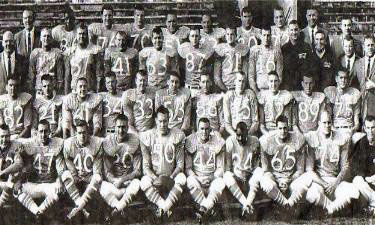
References: The Little League That Could: A History of the American Football League, Ken Rappoport (2010)
Top of Page
|
|

